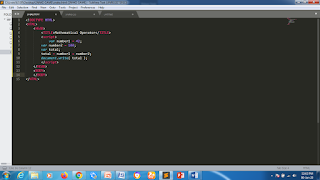Monday, January 6, 2020
FREE JAVASCRIPT COURSE – Lesson 8
Hi friends, today we will be
discussing an important topic. The topic
is Mathematical operators! Hey, don’t
panic, we are not here to solve maths. I will just walk you through some mathematical
operators that enable JavaScript to function in a unique way.
Some of these mathematical operators in
JavaScript include:
1. Plus symbol ( + ) : it is used for adding two variables together. Hence, it represents an addition.
2. Minus symbol ( - ): This is used when you want to perform subtraction.
3. The Asterisk symbol ( * ): it is used when you want to perform multiplication.
4. Forward slash symbol ( / ): It is used when you want to perform division.
5. Percentage symbol ( % ): It is basically used for modulus calculations.
Make sure you note the above
mathematical operators very well. We will be using it in most of our subsequent
lectures.
Now let us put what we’ve just learned in to practice.
Open your code editor and punch in the following codes.
<!DOCTYPE HTML><HTML> <HEAD> <TITLE>Mathematical Operator</TITLE> <script> var number1 = 42; var number2 = 100; var total; total = number1 + number2; document.write( total ); </script> </HEAD> <BODY> </BODY>
It will look like this on your code editor
Please note that the plus symbol(+) between number1 and number2 does not mean "join together " or
concatenation. It simply tells JavaScript to "add up" number1
and number2.
Now try out something I would like
you to take special notice of. So go back
to your codes, precisely line seven (7) which
reads: var number2 = 100;
Put 100 in a quotation mark, it
will look exactly like this
var number2 = "100";
Save your code and try running it
again (or simply refresh your browser). The output will look like this:
42100
Now let me explain what just happened.
Whenever you put a variable inside quotation marks, it will automatically turn
such variables into text. What JavaScript will simply do is to join them
together (or concatenate them), instead of adding them up. In our next lesson, you will learn more about Concatenation.
Stay cool!
Subscribe to:
Post Comments
(
Atom
)









No comments :
Post a Comment